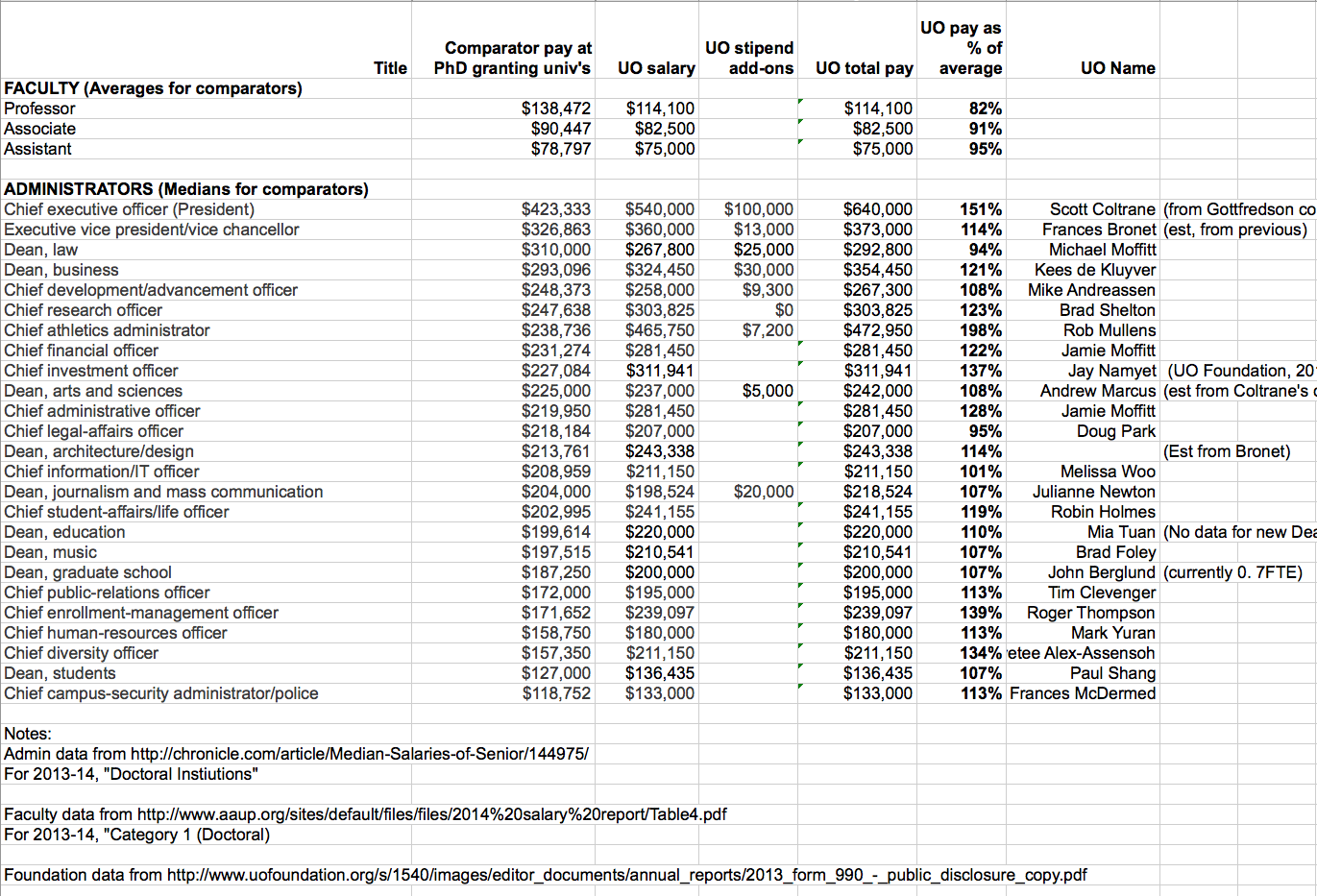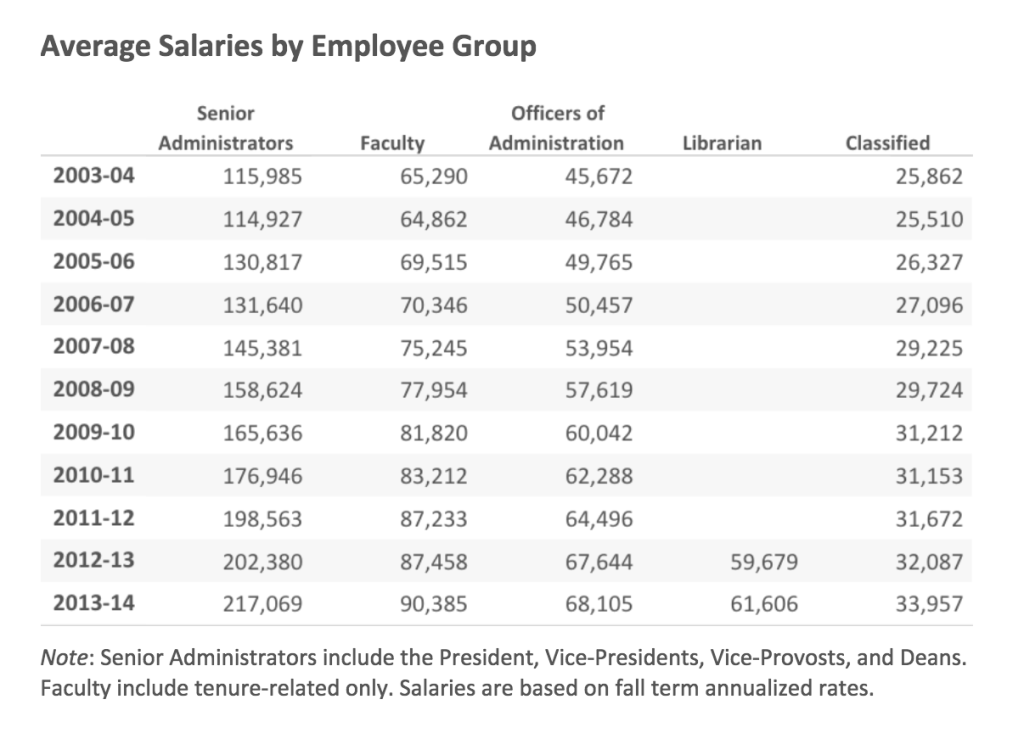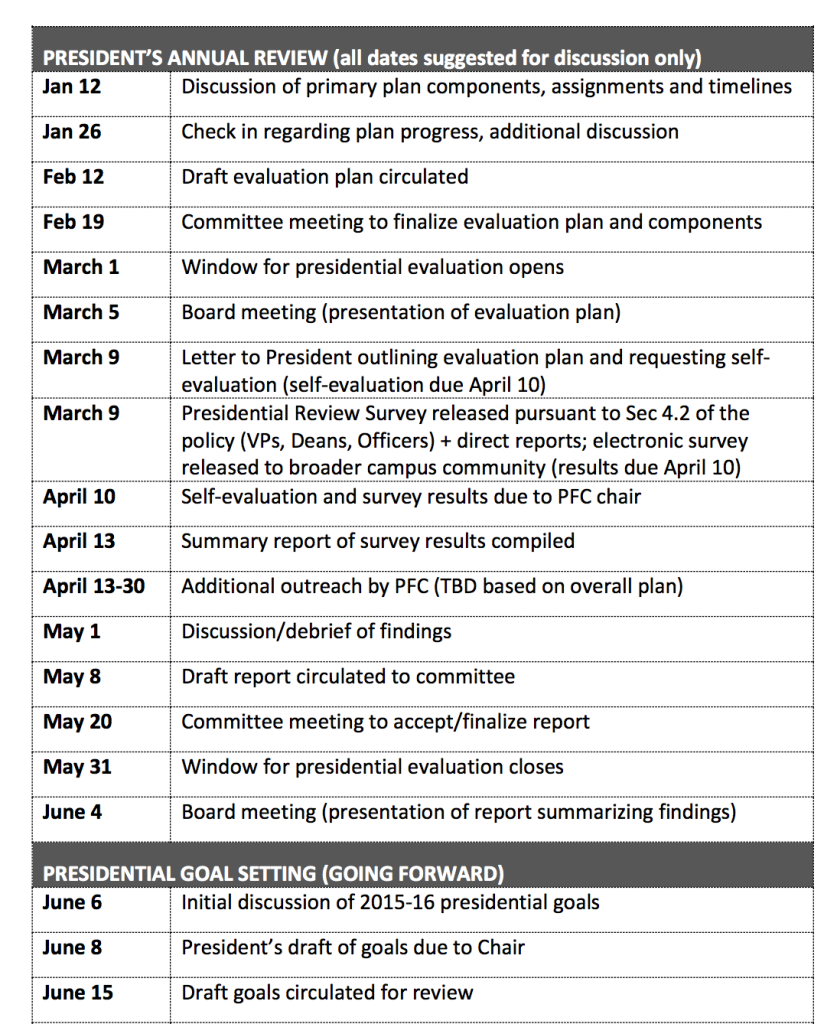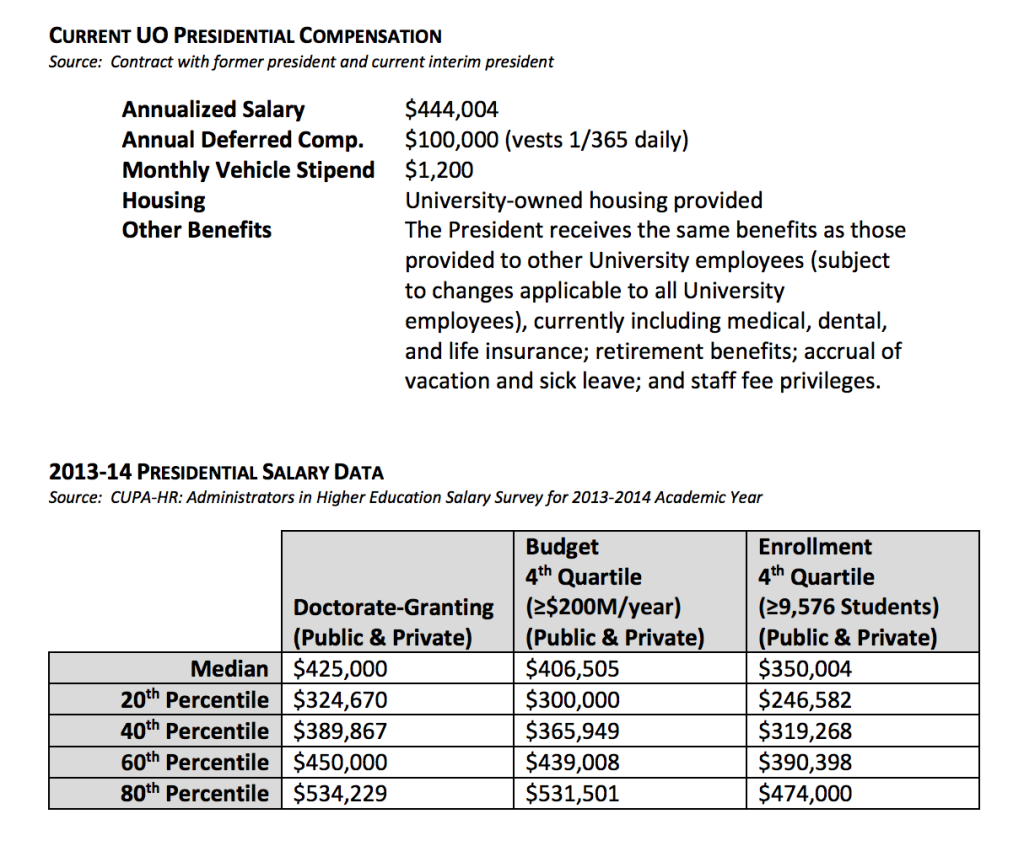Highlight of the day’s meetings: Page down for the live-blog of the Presidential Factors Committee meeting. They are setting up a reasonably open evaluation process for UO presidents starting next month, and setting pay for a new President.
Ginevra Ralph is chair, she runs a tight meeting. She was very cognizant of the need for transparency and the problems with paying a president more than our comparators when staff, OA, and faculty salaries are below comparators.
VPFA Jamie Moffitt really didn’t want to talk about that data. I assume she’s just being modest, since she’s making out pretty well. So here it is, from UO’s own IR website and other easily obtained public sources:
And a snapshot from last year, showing salaries for faculty and some specific central admins at UO versus comparator data:

The reports from the Wednesday’s committee meetings are here, and from Thursday’s meeting are here.
12/12/2014: The 8AM full board meeting is not off to a good start, given the quotes from Board Chair Chuck Lillis in today’s RG story about UO’s new Sports Product program. They make the University of Oregon Board of Trustees look ridiculous. And a board in their position cannot afford to look any more ridiculous:
… Lillis, however, wasn’t prepared to let the subject of efficiency drop. His friend, retired UO business professor Roger Best, worked at General Electric when Lillis was an executive there, he said.
“He was a world class business school professor,” Lillis said. “In the ’80s he routinely turned down $10,000-a-day as a consultant. He was the executive of a big British firm when he lived in Eugene and he commuted on the Concorde. He has started two businesses and sold them both — and is a very large donor to the university,” Lillis said.
That certainly is an interesting definition of a world class business school professor.
If the university is not going to trust someone like that, Lillis said, who will it trust. “We have this, like, superstar. …
… Barbara Altmann, vice provost for academic affairs, said the various committees gauge the soundness and coherence of proposed programs and ensure that the proposers have a stable line up of courses to guarantee quality for students who pay a lot, especially for business graduate degrees.
8:00 am (other times approx.) RECONVENE PUBLIC MEETING, FORD ALUMNI CENTER, GIUSTINA BALLROOM
Usual live-blog disclaimer: This is my opinion of what people said, meant, or should have said, nothing is a quote unless in quotes.
8. Overview of Research Funding
Vice President for Research and Innovation Brad Shelton will give an overview of the University
of Oregon’s funded research programs.
I missed most of it seems pretty similar to last year’s. Shelton is interim VPR, appointed after Espy left for a university that she thought had a better football team. Whoops.
Shelton doesn’t have the research background that would be normal for this job (short vita, no NSF grants) and he’s rather amazingly overpaid. He gives a reasonably informative talk though, and given his control over our limited research funding, no one on the faculty can afford to look cross-wise at him, unless you’ve got a pipeline to that sports product money.
Shelton ends his talk with a note of approval for the changes that Espy made in UO’s research office, and a word of thanks to Mussolini for getting those trains to run on time.
9. Government Affairs Updates and Legislative Previews
9.1 Betsy Boyd, Associate Vice President for Federal Affairs
From the unwieldy docket:
Summary: The University of Oregon worked with the Oregon delegation, higher education associations and other policy makers to support the university’s federal agenda throughout the 113th Congress through meetings and events in Washington, D.C. and in Oregon with participation from students, faculty and administrators.
UO worked strategically with the Association of Public and Land-grant Universities (APLU), the
Association of American Universities (AAU), and our sister Oregon universities to carry forward a
coalition agenda involving student aid, research and budget advocacy. The University of Oregon also
acted on opportunities of special significance based on the unique characteristics of our campus, faculty
and students. Examples of those opportunities include
(1) Pell grant and student loan deduction
changes;
(2) advocacy for the U.S. Geological Survey to invest in sensors for a west coast public
earthquake early warning system (that benefits research in addition to providing public safety); and
(3)balanced funding for the US Department of Education’s National Center for Education Research (NCER) and National Center for Special Education Research (NCSER).
I think she said we’ll have 5 or 6 minutes warning in PLC before the earthquake hits. OK, that’s unfair, sorry.
She’s UO’s lobbyist. UO is supporting continuance of the IRA rollover clause that incentivizes donations to universities. (That’s interesting, UO spends money on lobbying for federal tax policy. What would it take to get UO to lobby for ending the federal tax deduction for giving to big-time college sports? How about just the state deduction?)
9.2 Hans Bernard, Associate Vice President for State and Community Affairs
Over the last 20 years the state has defunded UO. OSU has done better, in part because the legislators figured Phil Knight would take care of us, in part because as Beavers they hated the Duck excesses.
The relative defunding was most notably in construction. Western UO made out like bandits, because a legislative leader also worked for WOU, and was a bandit.
With the new independent board the state is going to be even less likely to support construction, though it seems we’re going to get a little more GF money. This guy’s job is to try and fix this. Tough job, but he seems quite competent.
He’s also surprisingly optimistic given the new budget, so Jamie Moffitt quickly cuts him off and explains there’s no new money. PERS costs are up, the tuition buydown deal is continuing but does not fund any new limits on tuition. The well is dry.
Bernard: The gov did an incredible job keeping us at flat funding. We expected worse. We’re hoping to now lobby the gov and legislature for new funding, seems optimistic. Not making Jamie happy, she’ll needs the drought story going into faculty bargaining.
Performance based funding: The usual benchmarks. There will be a stop-loss clause for a few years.
Gov and HECC made $275M for higher ed construction overall this biennium. UO got less than a fifth of that. Seems disproportionally small – but then why would the Gov give us scarce money, when everyone thinks Phil Knight’s going to give that $1B any day now?
10. Invited Academic Presentations
10.1 College of Education, Dean Randy Kamphaus
New guy, from Georgia State. Haven’t heard him talk before.
10.2 School of Music and Dance, Dean Brad Foley
I’ve been sticking around because was hoping he’d come in with a quartet, and start with a brief sonata. Nope, powerpoint.
Largest and most comprehensive music program in NW. 25% of Oregon music teachers. 100% placement rate for grads who want K-12 teaching jobs. Reorganized so students can get degree and license in 4 years.
He’s proud of the Jazz program. (I’m suddenly imagining a Music School Dean, some day far off in the future, telling his grey-haired Board of Trustees that he’s very proud of the program in classical Hip-Hop, as they all give approving nods.)
SOMD people travel all over the country and world, lots of outreach. (Brian McWhorter and Laura Wayte from Music and Dance also run an amazing SAIL summer camp, for HS students. The students write, rehearse and perform a performance piece in one week. Usually a pretty funny one. Parents come, it’s beautiful to watch it happen and see what the experience means for the students’ self-awareness and confidence.
Foley goes on to fundraising priorities. In the most creative appeal I’ve heard yet, he describes the cramped stage of Beall Hall, and raises the specter of a fatal cello-bow stabbing as the result of over-enthusiastic bowing.
11. Executive Session: Collective Bargaining Issues
Note: Lunch will be provided for trustees and required staff only.
2PM, closed executive session ends, no new full board business, on the the Presidential Factors Committee Meeting, below.
12. Other Business
ADJOURN
Presidential Factors Committee Meeting
Friday, December 12, 2014 at 2:00pm, Ford Alumni Center, Room 403
Notice | Agenda | Minutes
Ginevra Ralph: Charged with establishing an evaluation process for the president, based on academic plan. There will be an annual evaluation and a more in depth triennial one. We will also establish the president’s compensation.
(Good news: The UO Board is not going to put up with the sort of secretive review that Gottfredson got away with from OUS:)
Allyn Ford: (He’s the guy who was on the OUS board that fired Lariviere, and then ran the search that brought us Mike Gottfredson) talks about consultants reports.
Kari: Current compensation, including deferred compensation, seems to be competitive. His Q is it enough to attract a good candidate.
Ballmer: Search firms are telling us we need $650K inc. deferred.
Ralph to Moffitt: How will we pay for it?
Moffitt: $100K or more is not a big deal in the scheme of things.
Ford: Movement towards more performance based compensation, but this is very hard to measure and these schemes haven’t worked well for presidents.
Moffitt: Remember when we talked about retirement plans? Pres SRP is a “very small plan” that provides deferred pay to top it up above the normal IRS limits for regular people. Only pays on departure, defined benefit.
Ralph: We could o something different?
Ballmer: We can go back to the search firm and ask for alternatives.
Ralph: I’m very uncomfortable with the idea of a performance bonus.
Kari: A number of universities are trying to implement performance bonuses, in practice these are very subjective, not used very broadly, and not attractive to new hires.
Ballmer: In my experience these things amount to votes of confidence by the board.
Ford: It would be a lot of extra work for us.
Susan Gary speaks: I understand that a search firm will want us to go high. Looking at faculty and staff and OA salaries, and athletics, I have a problem with paying more than the median. But we may have to go there. Seems like a lot of money. We tell potential faculty hires about the great view and the air here – why not say the same to presidential candidates?
Chapas: Suppose we get a great candidate who could bring in new dollars, and increase faculty salaries? It would be an investment. And given recent events we made need to pay more.
Kari: Have to pay above the median.
Ralph: We need more analysis of UO salaries for faculty etc. before we pay a lot for a Pres.
Wilhelms: We have an RFP out to Mercer for more analysis of Pres salaries (Me: God no, please don’t spend more money on consultants. Or just look at ir.uoregon.edu, or the Chronicle database, etc.)
Ballmer: I can look into this more.
Ford: Every time you try to pull someone away from a current job you have to pay more.
Lillis: What about retention? Some % of pay only if you stay for a certain number of years? (Like, $940K for 2 years? OK, that was unfair to Lillis. $940K was cheap for getting rid of that man, I thank you sir!)
Lillis: I read 4-5 contracts, they are all over the place. Two had use of private airplanes, etc. Lots of different retention schemes too.
Gary: Presses on looking at lousy UO faculty salaries before. Ralph agrees.
Ballmer asks about UO comparators – same size? (No, usually much larger, bigger budgets, endowments.)
Moffitt: We have lots of UO faculty data. She actually does not know what level of detail on comparators we have. (And Moffitt was advising the admins on faculty salary bargaining last year? My god, it’s all starting to make sense. She didn’t have a clue about how low UO faculty salaries are in comparison.)
Ralph: On to goal setting for Coltrane, Like to ask him for 5 or so goals. Want more transparent review process for President. (Thank you for saying this!)
More Ralph: Like to do some conversations with campus and community about how they perceive the president. (We still like Scott, we just want him to start being a real leader, starting by cleaning out the Johnson Hall snake-pit.)
Ralph: We need to protect people’s right to complain, e.g. with Ombud, we also need to figure out in advance how to avoid the sorts of problems we’re seeing. What happened at the campus search forums? Would those data help set goals?
Willcox: Attendance was low. For faculty, just that blogger guy Harbaugh, and one or two others.
Wilhelms: I circulate the online responses. They are *very* clear on what people want in a new president. (An anti-Gottfredson, but lets not fight the last war.)
Gary: Has anyone looked at AGB for examples of what other U’s do?
Wilhelms: I’ve put out that Q on their listserv. Or you could hire another consultant.
Ralph: Listserv is a good idea, let’s hold off on consultants, lots of people on campus with knowledge of this sort of thing.
Lillis: Some components on evaluation will be quantifiable and short term, others qualitative and long-term. For example, when I read Gottfredson’s evaluation, it was mostly about process. He had X meetings, Y people came, … I’d rather focus on outcomes. Main point is to use evaluation as a way of having a conversation with candidates about goals. (Full disclosure: My MS advisor kept my skis looked up in his pickup, except on Sundays, telling me it was easier to monitor my inputs than my outputs.
Wilhelms: Duration is something to think about. Search firm asked if we’d be interested in longer term.
Park: Common nationally to also give the President academic tenure, so he’s got a better bargaining position for his buyout if he’s a failure as a leader.
Ralph: We’ll get started with some web-based form for campus input.
Ford: Timeline?
Wihelms: Ballmer would like to start in Jan, needs to know compensation.
Ralph: We’ve all seen some university problems that need to get fixed, and asked Coltrane to set his personal goals. How soon can we move?
Wilhems: Purchasing will start preparing potential contract language next week.
Ralph: Thanks for running this marathon, we’re adjourned.
And in an admirable bit of transparency (It took months and finally an order from the Oregon Attorney General to get these comparisons for Frohnmayer) they’ve even posted the comparison data showing that UO is quite generous with its presidents, compared to peers with similar budgets etc.:



I hope everyone reads the RG story and comes away alarmed at what we have gotten into. If not for faculty protest, the board was about to pass a sweeping policy based on entirely the board chairman’s muddled understanding of what some old friend told him about his experiences, some years ago. Is this how to make policy?
This is the man (Lillis), remember, who will have the main say about our next president. I wonder what sort of personal anecdotes, rumors, misunderstandings, etc. he will rely on in making that decision.
Boyd is basically parroting the Burke-Lewis presentation from two weeks ago, in a couple of cases using their exact language (e.g. the description of sequestration). Not to be unkind, but I’m not getting anything new out of this–not much talk of what the federal landscape looks like for UO specifically.
thanks, got a link?
Nope, but I have a pdf of Lewis-Burke’s slides that I could share with you over email.
thanks, uomatters at gmail
Well I’ll be, t took union man Kurt Willcox to figure it out. Quoting from the RG article, “Board member Kurt Willcox, however, examined the timetable and found, “the clog appeared to be right at the beginning, within the (business) department,” he said. That phase lasted almost two years. How did Lillis respond? “It sounds like I was just incorrect,” Lillis said, adding, “I still think (efficiency is) a noteworthy objective.” So the take away here is this: Even when he’s wrong, he right.
“It sounds like I was just incorrect” sets my BS detector off. This was Lillis’ big motivation, the story was relayed to him by a personal friend, and he didn’t know that it was tied up at the department level for two years? Give me a break. Let’s be sure to fact-check Lillis very carefully in the future.
The link to last week’s presentation by Lewis-Burke can be found at gcr.uoregon.edu/federal-affairs. Please read the board packet for the detailed information you seek.
Thanks Ms Boyd. – link:
http://gcr.uoregon.edu/sites/gcr2.wc-sites.uoregon.edu/files/uploads/Campus%20Presentation%20December%202014%20%282%29.pdf
Thanks for making the link work, Bill. Sorry my presentation didn’t compete successfully with your multi-tasking. Most of my 10 minutes of remarks focused on the FY15 CRomnibus impacts on student aid, especially Pell recipients, and research with an emphasis on the work of our geology and COE colleagues. Presenting for both the BOT with bloggers in attendance are both new experiences.
Thanks, I can imagine. Sorry. I cribbed some stuff from the docket for you. Maybe someday they’ll post that with hyperlinks. If only UO had a PR person or two to work on useful stuff like that, instead of all these “Duck advocates”.
Publius writes, “…if not for faculty protest…”
It is a given that Boards can make mistakes, and it was certainly anticipated that a new board will make beginners mistakes. Regressive Board actions, whether intentional or accidental, are always a potential threat to academic freedom. Constitutionalists understand that constant vigilance is the price of liberty. The recent events convince this Old Man that we have a well-intentioned Board and that our vigilant Faculty will remain ready to leap to their aid.
Those who want to help should run for the Senate, or, lacking the time, should attend meetings of interest and speak out. Remember, all Faculty have the right of addressing the Senate, which includes making motions and participating in discussion.
All and well in Dean Foley’s presentation, with one detail missing: SOMD faculty perform all over the world, teach outrageous amount of weekly contact hours, publishing like crazy…. and are the lowest payed faculty on campus. So Foley should have said ”we have word class faculty despite the fact we pay them like shit”.
Yes, pay in music is low, but it s not the lowest on campus relative to comparators. the right key to sing in should be c for comparators.
What 12 tone row said.
Recruiting faculty for the School of Music is hard. How comforting to know that we can tell our hot prospects: “Even though we’re the lowest paid unit on campus, we’re NOT QUITE the worst-paid on campus relative to our comparators. Close, though.”
Someday I hope to be able to say simply, e.g., “we earn as much as our counterparts at comparator schools.” Wow!
Moose, I am right there with you. One of the first steps to that goal is to keep nagging the university and SOMD administrations, and, yes, the leadership of the faculty union, about the importance of “external equity.” (Even the union seems distracted by other issues these days.) Bringing the salaries at our school in line with the comparators would solve a host of problems with retention of faculty as well as recruitment. I’ve been a voice for equity both at the school and union. Want to join me?
jfboss is correct.
Pay for UO full professors in music was 81% of the average for AAU publics.
The Music and Dance comparisons for 2013-14 are on page 26, here: http://ir.uoregon.edu/sites/ir.uoregon.edu/files/UOwithAAUPublicsbyDept_2013-14.pdf
Agreed, eyes on the ball, progress toward external equity everywhere, in music and dance at 71 percent for fulls, in comp lit at 65, in econ at 67, in math and English, both at 78, and so on across campus. Most are roughly twenty percent below, too much for benefits and cost of living factors to keep us competitive. Key of c for everyone.
United Academics is not missing this – equity, both internal and external, remain serious problems for faculty at the UO. Several university administrators have openly denied the problem and we will hear yet again that there are no equity problems at the UO. Of course, faculty know differently: the anecdotal remarks on UOM, our polling of members, and the actual salary data tell a different story. We cannot have a great university without fixing this. Our union is fully committed to moving forward on this and other pressing concerns for faculty. Knowing this, I hope every faculty member puts in a couple of hours each month – showing up to bargaining sessions, talking to colleagues, attending a union meeting, volunteering as a department liaison, etc. – to assure that our union delivers the best deal possible for faculty. Though often treated as some outside object, our union is the most powerful vehicle at our disposal for solving these types of problems. Get ready, we start in about 45 days.
To michael, good. Two suggestions for the secon contract negotiations. Bargain for closing some x percent of the comparator gap for all units, otherwise a low place such as music will not make any relative headway. Second, we need similar data for instructors. In any event, even a cynic will be pulling for you. Good luck.
It’s actually hard for me to believe this sentence in the above.
“Several university administrators have openly denied the problem and we will hear yet again that there are no equity problems at the UO”
That we have external equity problems is easily demonstrable at the associate and Full professors, across all disciplines. This was plainly acknowledged by CAS and formed the basis of their raise structure (again, many CAS assistant profs did not get that May 2011 raise because they were at external equity).
The cumulative affect of the UO union raises as of July 1, 2014 have lessened the external equity gap somewhat. I actually think its important for bargaining purposes that the correct data is used.
If you use the data prior to July 1 2014 (which is the available data right now) the equity situation looks worse than it actually is – with the most updated data, its better, still not very good, but no longer abysmal. I am sure that UOmatters will diligently post the most current salary data when it becomes available.
Matters of “internal equity” around this place are bizarre, I find, and never dealt with very objectively. The potential cluster hires will likely make this issued of internal equity even worse.
And speaking of retention — why did Johnson Hall abolish its so-called Fighting Funds? And just at the moment when a public push for faculty retention is being made?